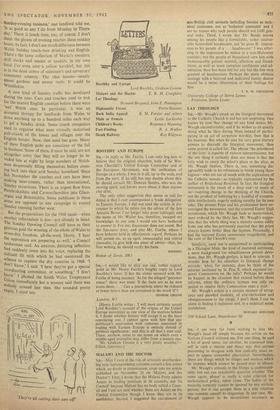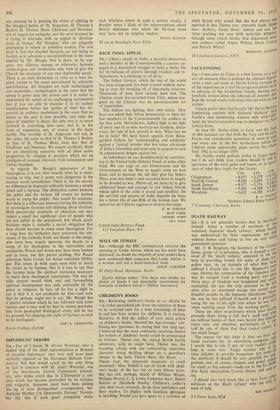SIR,—I am very far from wishing to bite Mr. Waugh's
head off simply because his article on the Vatican Council irritated me. For one thing. he said a lot of good sense; for another, he expressed him- self in such a sincere and direct was that anyone presuming to disagree with him radically must ex- pect to appear somewhat pharisaical. Nevertheless, there are things which he alleges and motives which he imputes which cannot be passed over in silence.
Mr. Waugh's attitude to the liturgy is understand- able; but one can reasonably question whether 'The same again, please' is really a valid criterion for ecclesiastical policy, taken alone. The habits of the majority certainly cannot be ignored by any realistic person; but if one accepts them as a sole criterion one commits oneself to stagnation. In any case, Mr. Waugh appears to be inconsistent inasmuch as one moment he is praising the virtue of sticking to the liturgical habits of 'St. Augustine, St. Thomas a Becket, St. Thomas More, Challoner and Newman' out of regard for antiquity, and the next moment he is trying to discredit, with an appeal to 'develop- ment in liturgy,' the 'liturgists' who are allegedly attempting to return to primitive models. The real truth is that the dreaded liturgists are not being so foolish as to advocate a neo-primitivism in the sense implied by Mr. Waugh. Nor is there, as he sug- gests, any alliance, strange or otherwise, between archeologists and 'modernists who wish to give the Church the character of our own deplorable epoch' There is no such distinction of roles as is here im- plied, except in the sense necessitated by scholarly specialisation. All liturgists are both archeologists and modernists: archeologists in the sense that the spring is purer near the source and it is easier to understand the nature of an unchanging sacramental fact if you are able to examine it in its earliest manifestation before the 'patina of time' has ob- secured its outlines; modernists in the sense that no return to the past is ever possible, and since the price of 'stability' is decay, the only way is to move forward to something new—new, that is, in the form of expression, not, of course, in the inner reality. The worship of St. Augustine was not, in this sense, the same as that of St. Thomas a Becket, or that of St. Thomas More, even less, that of Challoner and Newman. We cannot justifiably think we are identifying ourselves with all these noble progenitors by clinging to practices which are an amalgam of recusant reticence, Irish isolationism and Italian mystique.
As regards Mr. Waugh's abhorrence of lay theologians, it is not clear exactly what he is main- taining or why, but it seems very dangerous in the modern world nevertheless. There is, for the record, no difference in dogmatic authority between a simple priest and a layman. The distinction comes between the priest and the bishop. Of course no layman wants to usurp the pulpit: that would be nonsense. But there is a difference between having the authority to promulgate doctrine and thinking about doctrine. With present-day standards of education one may expect a small but significant class of people who are not called to the priesthood, but whose quali- fications make it virtually a moral obligation that they should become in some sense theologians. For a long time the Orthodox have preserved the sub- stance of the Catholic Faith, not thanks to the clergy, who have been largely ignorant, but thanks to a corps of lay theologians in the universities and seminaries. Pascal and Acton may have been laymen and in error, but this proves nothing. For Pascal substitute Saint Cyran; for Acton substitute DoBin- ger. The errors in both cases were held as much by clerics as by laymen. Nor is it true to say that the layman lacks the spiritual formation necessary to reach deep theological conclusions. The way he talks anyone would think real and far-reaching spiritual development was only attainable by the priest or religious. In fact, all he has a right to say is that it is not attainable by him—and even that he perhaps ought not to say. Mr. Waugh has a special vocation which he has followed with some success and it may well be that its nature precludes him from protracted theological study; but he has no grounds for denying the right of laymen as such to be theologians.







































 Previous page
Previous page